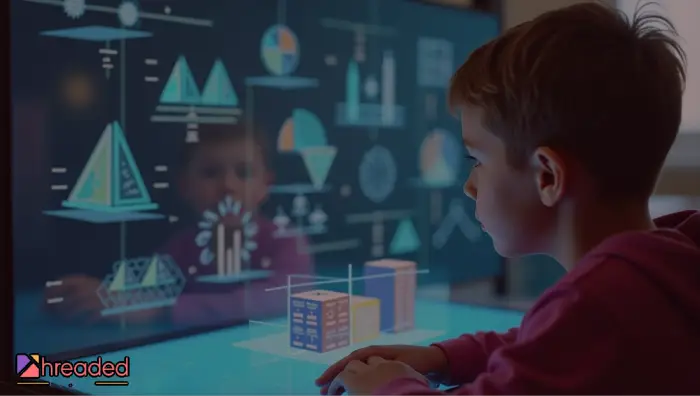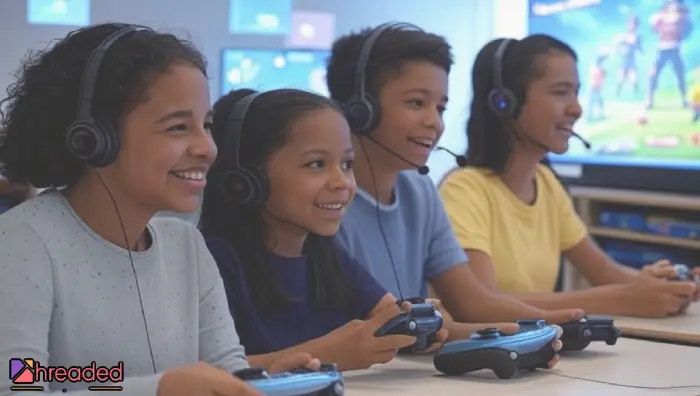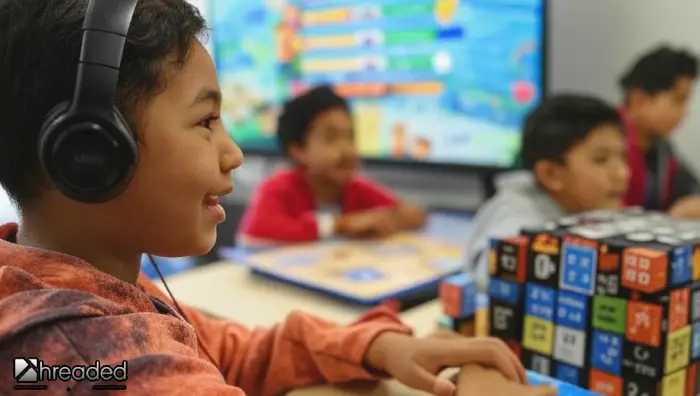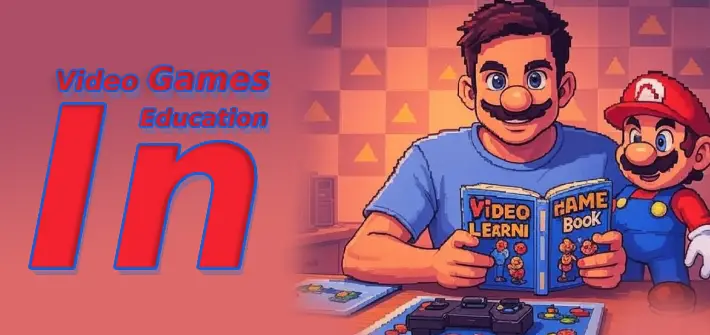In a world where screens dominate daily life, video games have emerged as more than just a form of entertainment. They are transforming into powerful educational tools, reshaping how students learn, interact, and solve problems. Whether in the classroom or at home, video games in education are bridging the gap between fun and fundamental learning.
Educators and researchers now recognize that video games can foster deeper engagement, encourage creative thinking, and provide interactive learning environments that traditional methods often lack. With storytelling, real-time feedback, and challenge-based learning, video games help students grasp complex topics in an intuitive and memorable way.
In this article, we’ll explore how educational video games are:
- Capturing students’ attention through interactive experiences
- Boosting problem-solving and critical thinking skills
- Making complex concepts easier to understand
- Enhancing social and emotional learning
- Introducing children to math, financial literacy, and more
Table of Contents
🎯 Capturing Attention Through Gamified Learning
One of the strongest assets of video games is their ability to captivate. Instead of passive learning, students are actively involved in the story, challenges, and decision-making. Games like Minecraft: Education Edition integrate academic content into virtual environments, where learners build, explore, and solve real-world problems—often without realizing they’re learning.
Gamified learning keeps students focused for longer periods, especially when compared to traditional lectures or textbooks. The visual design, rewarding feedback loops, and narrative progression keep curiosity high and boredom at bay.
🧠 Boosting Problem-Solving and Critical Thinking
🧩 Learning Through Challenges
One of the most powerful advantages of video games in education is how they push learners to think critically, solve problems independently, and learn through trial and error. Unlike traditional education, which often emphasizes memorization and predefined answers, games create dynamic environments where students must face challenges, adapt strategies, and explore different solutions.
Puzzle-based and strategy games, for instance, naturally lead students to identify patterns, manage resources, make decisions under pressure, and even predict outcomes based on past experiences. Learning through challenges is an immersive experience—one that makes mistakes part of the journey, not something to fear.
This is where video games shine: they teach students that failure isn’t the end—it’s just another step toward mastery. That mindset shift alone is transformative in how learners approach complex problems both in and out of the classroom.
🎮 Real Game Examples
Let’s take a look at some standout games that actively develop critical thinking and problem-solving skills in students:
🔹 Portal
More than just a puzzle game, Portal is a masterclass in logic, physics, and systems thinking. Players must solve intricate challenges using spatial reasoning and creativity. It’s essentially a science lab disguised as a game, encouraging players to form hypotheses, test them, and refine their approach—just like real scientific thinking.
🔹 The Legend of Zelda
This iconic series blends exploration, adventure, and complex environmental puzzles that require strategic thinking, resource management, and creative problem-solving. Each puzzle teaches students to analyze their surroundings and experiment with different solutions. It’s fun, yes—but it’s also a subtle and effective mental workout.
🔹 Human Resource Machine / Baba Is You
These two indie gems are goldmines for building logical reasoning and computational thinking. In Human Resource Machine, players essentially learn basic programming concepts through clever automation puzzles. Baba Is You, on the other hand, breaks every rule by letting players change the rules—literally! It’s all about system manipulation, abstract thinking, and imaginative logic.

💡 Why It Matters
Skills like analytical thinking, decision-making in complex situations, strategic planning, and learning from feedback aren’t just useful in school—they’re essential life skills.
When students learn how to think through games, the impact is deeper and longer-lasting than simply memorizing information. These games provide an interactive, pressure-free space to explore, fail, rethink, and succeed—a process that mimics real-world problem-solving in the most engaging way possible.
🧩 Simplifying Complex Concepts
🔍 From Abstract to Action
One of the most compelling advantages of video games in education is their ability to transform abstract ideas into tangible, interactive experiences. Whether it’s learning about fractions, physics, programming, or even historical events, video games provide immersive environments that allow students to see, feel, and experiment with concepts that are otherwise difficult to grasp in traditional classrooms.
For instance, instead of just reading about gravity in a textbook, students can experience gravitational forces in a game simulation, watching how objects move and react in real-time. Complex subjects like algebra or coding come to life through hands-on problem-solving, rather than passive note-taking. This shift from theory to practice makes abstract knowledge far more accessible and engaging.
By integrating video games in education, educators can bridge the gap between conceptual knowledge and real-world application, helping students internalize what they learn in a fun, memorable way.
🧠 Ideal for Visual and Kinesthetic Learners
Not every student thrives under the same teaching methods. In fact, many learners struggle with lectures or written instructions. This is where video games in education shine the brightest—by offering visual, interactive, and hands-on experiences, they cater to visual and kinesthetic learners who need more than just words to understand a subject.
In a game-based learning environment, students are active participants, not passive receivers. They see cause and effect, experiment with outcomes, and adjust their actions based on immediate feedback. This type of learning is especially beneficial for students who need to “do” in order to learn.
Games that teach coding, for example, often allow learners to see the direct result of their code—whether it’s a robot moving or a puzzle being solved. This instant visual feedback loop is incredibly powerful in reinforcing comprehension.
By using video games in education, we create inclusive learning spaces where every student—regardless of their preferred learning style—has a chance to succeed.

🎓 The Power of Game-Based Understanding
At their best, educational games don’t just simplify difficult concepts—they empower students to take ownership of their learning journey. They provide safe environments to explore mistakes, learn from feedback, and try again—key principles in mastering challenging topics.
So instead of struggling with abstract formulas or theories, students can learn through play, unlocking new ways to understand, apply, and retain knowledge.
The more we explore the potential of video games in education, the more we realize their role isn’t just supplementary—it’s revolutionary.
👥 Enhancing Social and Emotional Learning (SEL)
🤝 Building Emotional Intelligence Through Play
In today’s classrooms, academic success is only part of the equation—social and emotional learning (SEL) is just as important. One of the most underrated benefits of video games in education is their ability to help students develop critical SEL skills in a safe, engaging, and interactive environment.
Unlike traditional assignments, multiplayer and cooperative video games naturally encourage students to collaborate, communicate, and manage emotions in real-time. They present complex social situations where players must work together, resolve conflicts, lead a team, or make thoughtful decisions based on group dynamics.
Through gameplay, students not only learn how to win—they learn how to lose with grace, compromise with others, and support their peers. These experiences build a foundation for real-world social success.
🗣️ Teamwork, Communication, and Leadership
Video games in education offer dynamic platforms for practicing teamwork and communication skills. In cooperative environments, students are required to assign roles, share responsibilities, and make group decisions. This type of interaction enhances leadership qualities and encourages students to listen, speak clearly, and empathize with others’ perspectives.
Games like Overcooked, Keep Talking and Nobody Explodes, or Minecraft: Education Edition put communication at the core of gameplay—where success depends on how well players cooperate and coordinate.
These virtual scenarios mirror the challenges students face in real life, helping them understand the importance of clear dialogue, mutual respect, and collective problem-solving.
🎭 Empathy, Moral Choices, and Emotional Reflection
Many role-playing games (RPGs) go beyond mechanics and strategy. They place players in rich narrative worlds where moral dilemmas, ethical choices, and emotional consequences are central to the story. Games like Undertale, Life is Strange, or To the Moon invite students to step into the shoes of others, encouraging empathy and emotional awareness.
Making decisions for a character forces players to think deeply: What would I do in this situation? How would this choice affect others? These reflective moments foster emotional intelligence and perspective-taking—skills that are invaluable far beyond the classroom.
Incorporating video games in education not only supports cognitive growth, but also helps students navigate their feelings, understand the emotions of others, and build healthy relationships.

💬 Real-World SEL Impact
SEL skills like conflict resolution, self-awareness, and empathy are essential for students’ personal development and future careers. By integrating video games in education, educators provide learners with meaningful ways to practice these soft skills in a format that feels natural and exciting.
More than just games, these digital tools become social playgrounds, where students safely experiment with identity, relationships, and ethical behavior.
🚀 Increasing Motivation and Academic Engagement
🎯 Game Mechanics that Fuel Motivation
One of the most powerful advantages of using video games in education is their ability to ignite motivation in learners of all ages. Unlike traditional lessons that may feel rigid or repetitive, educational games engage students through interactive goals, progression systems, and reward mechanics that feel both fun and fulfilling.
Features like achievement badges, unlockable levels, and in-game rewards tap into students’ intrinsic desire for accomplishment. These mechanics transform learning into a goal-oriented adventure, making it easier for students to stay focused and push through challenging material. Whether it’s earning a new skill badge or unlocking a new part of a virtual world, every success feels earned—and that feeling drives deeper engagement.
When designed with educational intent, these mechanics become more than just play. They’re powerful motivators that make learning personal, enjoyable, and self-directed.
⚡ Real-Time Feedback and Long-Term Engagement
Another key reason video games in education are so effective is their use of instant feedback. When students answer a quiz question or complete a math puzzle in a traditional setting, they might wait hours or days for a grade. But in games, feedback is immediate—you either pass the level, earn the points, or try again. This instant reinforcement helps learners quickly understand their mistakes and improve without feeling discouraged.
Moreover, the constant loop of action-feedback-adjustment helps build a growth mindset. Students begin to associate effort with improvement and develop a resilience to failure—they try again, not because they’re told to, but because they want to succeed. This kind of self-motivation is a cornerstone of effective education.
By combining real-time response systems with emotional rewards and a sense of accomplishment, video games in education create an environment where students are not only active participants but also enthusiastic learners.

🎓 Conclusion: The Future of Learning Through Games
As education continues to evolve, so too must the tools we use to inspire and educate students. Video games in education are no longer just a novelty—they’re a dynamic part of modern learning strategies. With the ability to build critical thinking, problem-solving, social awareness, and motivation, educational video games provide a bridge between engagement and academic success.
By integrating game-based learning into the classroom, educators unlock a powerful approach that resonates with today’s tech-savvy learners. Whether it’s understanding abstract math through gamified puzzles, building empathy via character-driven narratives, or boosting motivation with real-time feedback, the benefits are far-reaching.
The future of education lies not just in textbooks and lectures, but in interactive, student-centered experiences—and video games in education are leading the charge. It’s time to embrace their full potential.



